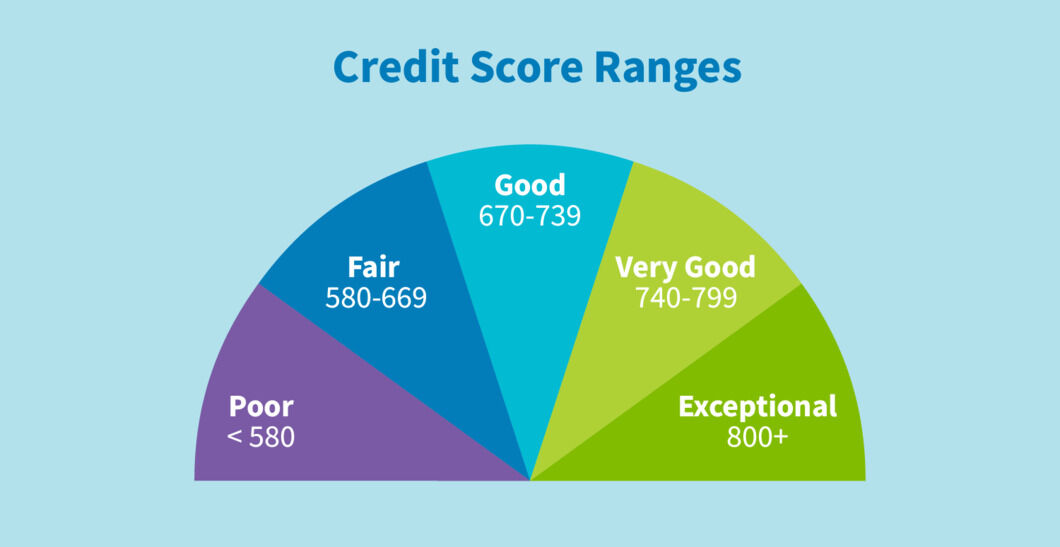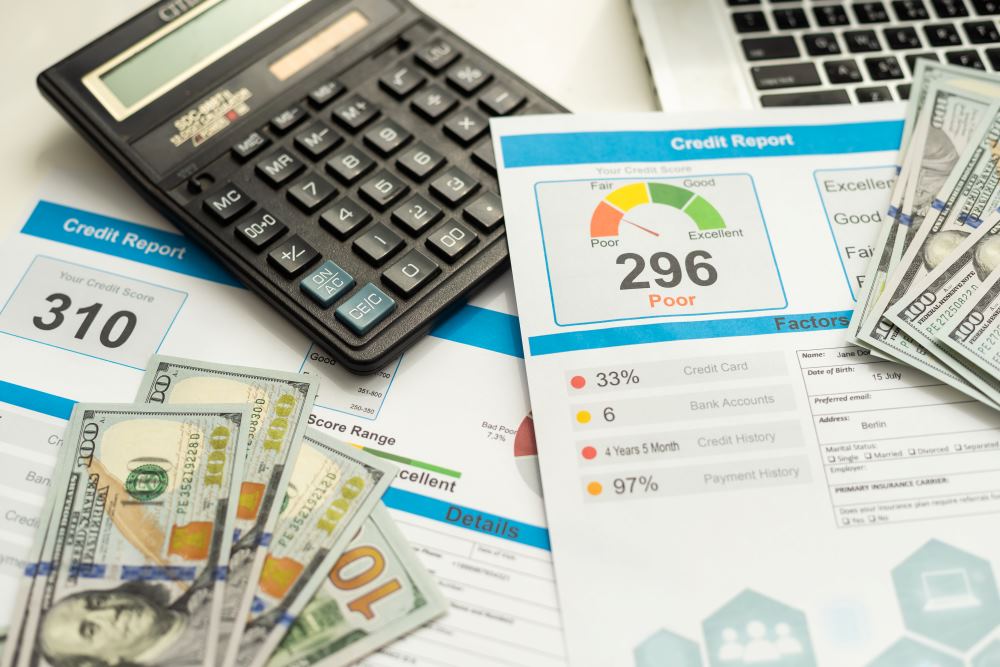
Check Credit Score for FREE
Instant in 2 Mins. No Impact on Credit Score

What are the Various Ranges of Credit Scores?

Credit score rankings impact the terms and situations of loans, mortgages, credit cards, and other credit scores that might be necessary for financial transactions. Using those scores, creditors can analyse a person's creditworthiness, which enables them to calculate the risk of granting loans.
Credit bureaus, including Equifax, Experian, CRIF High Mark, and CIBIL (Credit Information Bureau India Limited), are principally in charge of overseeing the credit rating system in India. These agencies create credit reports and ratings for individuals by gathering credit-related data from financial institutions and other sources.
What are the Credit Score Ranges?
Different credit bureaus might use different scoring models. But, in general, it is accepted that a credit score above 700-750 is generally considered good, while one below 650 is considered to be either fair or foul.
The standard credit score ranges are as follows:
What is a Good Credit Score?

In general, it is accepted that a credit score above 700-750 is generally considered good. Since the highest possible score is 900, the best credit score range is around 750-900.
It is also good to remember that every lending institution has their own method of risk grading. For example, one bank may consider a score above 700 to be good, while another bank may prefer a score above 750. Thus, in general, a score that is above 750-800 should be considered good in most situations.
What is a Bad Credit Score?

A credit score below 650 is considered to be either fair or bad. Those who fall into this low range are said to have “subprime” credit scores, and lenders will classify them as people who might have a hard time repaying a loan.
Bad scores can result in difficulty obtaining loans, your credit applications being denied, and even if you do get approved you might face higher interest rates.
The good news is that a bad credit score is not fixed. Once you know what is keeping your score low, you can do a number of things to improve your credit score over time. This includes reviewing your credit report regularly, paying your bills on time, keeping your credit utilization, and limiting any new credit requests.
Why is it Important to have a Good Credit Score?
Banks and other lending institutions use your credit score to decide whether or not they will approve your requests for loans and other credit. Thus, if you have a higher credit score, it shows that you have demonstrated responsible credit behaviour in the past, and this may give potential lenders more confidence in approving credit requests.
You can also avail yourself of other benefits, such as lower interest rates, better terms of repayment, and a quicker loan approval process.
What is the Best Credit Score in India?
In India, CIBIL [Credit Information Bureau (India) Limited] scores generally range from 300 to 900, with higher ratings indicating decreased credit risk and extra creditworthiness. While there isn't always a particular score labelled as the "first-rate" CIBIL rating, a higher credit score is typically favourable for people searching for credit products, including loans or credit playing cards.
While the precise threshold for a fantastic credit rating may vary among lenders and monetary institutions, a CIBIL score above 750 is typically considered first-rate. With a rating in this variety, individuals will likely have a better risk of acclaim for credit score merchandise. They can qualify for more favourable phrases like decreased hobby costs and better credit score limits.
Best Credit Score to Buy a Car
Your CIBIL score, which ranges from 300 to 900, explains how successfully you managed your prior credit. Your score must be at least 750 for your car loan to be authorised.
To be eligible for a car loan, you must meet specific requirements, such as being at least 21 years old, having a steady source of income, and having a clean credit history—your application's chances of being approved for a car loan increase if your CIBIL score is high.
Best Credit Score to Buy a Home
The minimum CIBIL Score that lenders often consider when granting a house loan is 650. Nonetheless, a score of 650 to 750 is regarded as good, and after looking into your other financial information, lenders can extend you an offer for a house loan. Average scores fall between 550 and 649; they require improvement. The score range from 300 to 549 is considered to be wrong.
If your CIBIL score is less than 750, you can still raise your chances of being approved for a home loan by choosing a longer duration, paying more down payment, decreasing your present debt, and increasing your income.
Best Credit Score to Buy an Education Loan
Education loans offer critical financial help during the academic journey, which is significant when determining whether to study abroad or in one's own country. Regarding education loans, the CIBIL score is a crucial component that determines loan acceptance in a big way.
Co-applicants' credit histories are essential for school loans; their scores usually range from 300 to 900. Obtaining an education loan for further studies is more likely if one has a minimum CIBIL score of more than 700. People who score lower than 700 can have trouble being approved.
Best Credit Score to Buy a Bike
A CIBIL score of at least 750 is required for a bike loan. A score above 750, typically considered significant, can be used to approve a two-wheeler loan. Generally speaking, a bike loan is a secured obligation that can only be approved if your CIBIL score is between 650 and 700.
Lenders may consider additional variables when determining your eligibility for a bike loan. This covers loan categories, historical payment delays, and income-to-debt ratio.
Best Credit Score to Buy a Business Loan
A CIBIL score of 700 or higher in India suits a business loan. This rating is based on a scale from 300 to 900, where 900 is the highest score. Nevertheless, the standards used by various lenders to determine what constitutes a high credit score vary.
For instance, some lenders may accept a borrower's credit score as low as 650, while others may require a minimum of 750. Several variables, such as payment history, credit utilisation, length of credit history, and credit mix, affect credit score.
The most critical component, which indicates the borrower's ability to make timely loan repayments, is their payment history.
What Affects Your Credit Score?
Maintaining a healthy credit profile and managing your money successfully requires understanding the factors that impact your credit score. Several positive and negative aspects, including credit utilisation and payment history, can affect your credit score.
History of Payments
Paying off debt on time each month raises your credit ratings more than any other element, yet even one late payment of more than 30 days can hurt your scores. Even more severe, long-lasting repercussions may result from bankruptcy, foreclosure, or accounts sent to collections. About 35% of your FICO (Fair Isaac Corporation) Score is determined by your payment history.
Total Amount Owed
Your credit score is impacted by the total amount you borrowed and the percentage of your available credit that is owed. A critical aspect in determining credit scores is your credit utilisation ratio, also known as your rate.
This is the percentage of your entire borrowing capacity that you are utilising on your credit cards and other revolving credit accounts. It is also among the variables that react to your activities the fastest.
Credit History Length
Statistics support the intuitive belief that having credit account expertise will help you manage your debt better. Because of this, your credit score will typically be higher the longer your credit history is, provided all other factors remain constant.
The age of your oldest credit account, your newest credit account, and the average age of all of your accounts are used by the FICO Score to assess your credit history.
Mix of Credit
Your capacity to manage various debts and credit types often improves your credit ratings. Credit score systems tend to favour a combination of revolving accounts (credit cards and lines of credit) and instalment debt (student loans, mortgages, auto loans, and personal loans). About 10% of your FICO Score comes from your credit mix.
Any New Credit Accounts
The number of new credit accounts you open can impact your credit score. When you apply for new credit, lenders conduct hard inquiries, which can temporarily lower your score. Applying for multiple new debts, especially when facing cash flow issues, can signal higher credit risk and affect your creditworthiness.
How to Improve Your Credit Score?
There are many proactive measures you can take to increase your creditworthiness. You can work towards raising your credit score and opening up more financial options by putting these tactics into practice and making a commitment to sound financial practices:
Create a Credit Report
As most significant lenders and card issuers do, one of the most crucial first steps in establishing your credit file is opening new accounts that will be reported to the three major credit bureaus. It can help to have at least a few open and active credit accounts since, without them, you cannot begin building a solid credit history as a borrower.
Don't Miss Payments Dues
Maintaining a long history of on-time payments is crucial for achieving excellent credit scores. Avoid missing payments by setting up automatic payments for the minimum amount due, and promptly communicate with creditors if facing financial difficulties. Additionally, staying vigilant with all accounts, including those not typically reported to credit bureaus, helps prevent potential credit score declines due to accounts being sent to collections.
Resolve Past-Due Accounts
Paying your bills in full could assist if you're behind. Keeping all of your accounts up to date will help your credit ratings, even if a late payment might appear on your credit record for up to seven years. It also prevents extra late penalties and future late payments from being recorded on your credit record.
Reduce the Balances on Revolving Accounts
A large balance on revolving credit accounts might result in a high credit utilisation rate and lower credit scores, even if you're still catching up on your payments. Credit cards and credit lines are examples of revolving accounts.
Limit the Frequency of New Account Applications
Although opening accounts could be necessary to establish your credit history, you should generally try to apply for credit only occasionally. Hard inquiries may result from each application, which may lower your credit ratings. However, inquiries can accumulate and negatively impact your credit scores over time.
The importance of credit scores in financial choices and transactions cannot be overstated. A high credit score indicates sound financial practices and facilitates obtaining credit cards, loans, and advantageous interest rates.
However, a low credit score might make it more challenging to take advantage of financial opportunities, lead to increased interest rates, or even result in credit applications being turned down outright. For this reason, financial security requires maintaining a high credit score through prompt payments, careful borrowing, and consistent monitoring.














